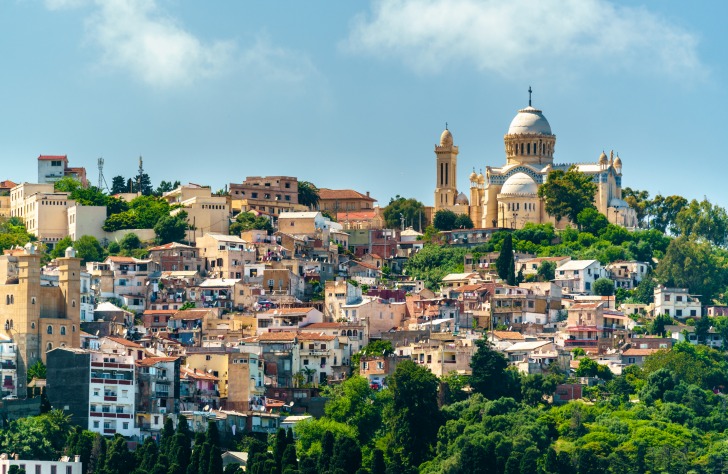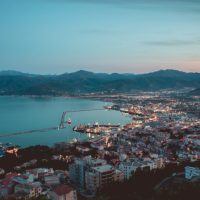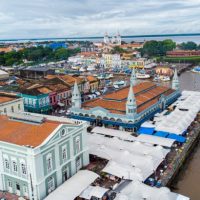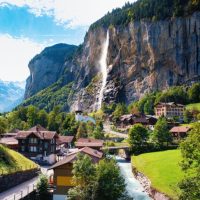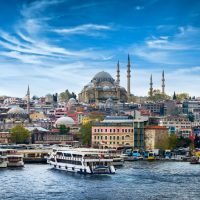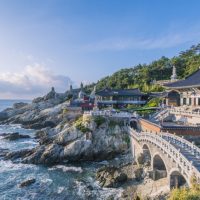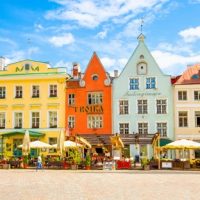If the Sahara Desert is the first thing that comes to mind when you think of Algeria, you aren’t alone.
The Sahara welcomes over 12 million tourists annually.
Given that the desert covers over 90% of the country, it is an important attraction for many visitors.
Algeria is the largest African country, ranging over 919,000 square miles.
Like its diverse landscapes, Algeria’s people, food, and languages change vastly from one region to another.
The country’s rich history is told through its varied architecture, which reflects several influences, including Moorish, French, Ottoman, and Haussmann.
Although Algeria has a long and storied history, filled with war, protests, and terrorism, most parts of the country are very safe to visit.
Its crime level is 62.5, approximately 12% higher than the United States.
When it comes to drugs, violent crimes, and murders, Algeria ranks much lower than America.
The US has three times more murders and twelve times more violent crimes than Algeria.
Algerians are known for being very friendly people.
You may even be invited into one’s home for a cup of tea or a meal.
However, most foreign governments do recommend tourists exercise caution when visiting remote, rural areas, the mountainous regions near the Tunisian border, and within 100 miles of Algeria’s land borders.
Tourists should also avoid Southern Algeria, which is prone to terrorism.
Are you considering traveling to Algeria?
Read on to learn more about the country’s most dangerous cities and tips on traveling to this magnificent country.
Contents
Most Dangerous Cities in Algeria
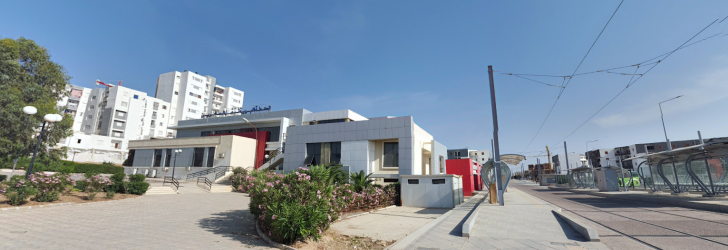
1. Sidi Bel Abbes
With a crime index of 71.08, the western city of Sidi Bel Abbes makes the top of our list of the most dangerous cities in Algeria.
This major agricultural and industrial city is an important part of Algeria’s economy.
It’s also home to some of the country’s most historic religious sites, including the 18th-century Zawiya of Sidi Bel Abbes mosque complex and the mausoleum of Sidi Brahim el-Mukhtar.
While Sidi Bel Abbes is a cultural and historical center, travelers should exercise extreme caution when visiting the area.
The city, which is located near the Moroccan border, is known for political unrest.
Protests and demonstrations often become violent, so it’s important to remain abreast of the current political situation at all times.
Muggings and pickpocketing are also common occurrences, so be aware of your surroundings at all times.
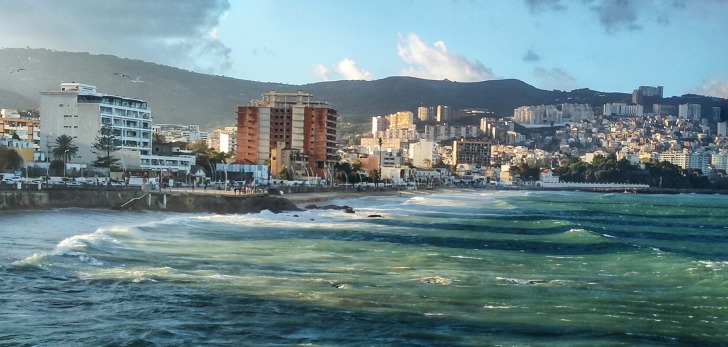
2. Annaba
Situated among the mountains and hills of the northeast, along the coast of the Mediterranean Sea, is the charming port city of Annaba.
Because of its coastal location, Annaba has been a hotbed of activity throughout its history.
Like Oran, the city is an economic and industrial center, primarily exporting steel, oil, and gas.
In addition to its exporting trade, Annaba’s economy relies on its reputation as a historical city.
Popular tourist attractions include the St. Augustine Basilica and the ruined Roman city of Hippo Regius.
While Annaba is a stunning and beautiful city to visit, it’s also known for being dangerous.
With a crime index of 60.24, Annaba is a hotbed for violent crime, including muggings, robberies, kidnappings, political unrest, and terrorist activity.
Despite its reputation for having a rich population, many of Annaba’s 400,000 residents are poor, so there’s also a high risk of becoming a victim of theft and petty crimes.
Visitors should be extra cautious when out in public.
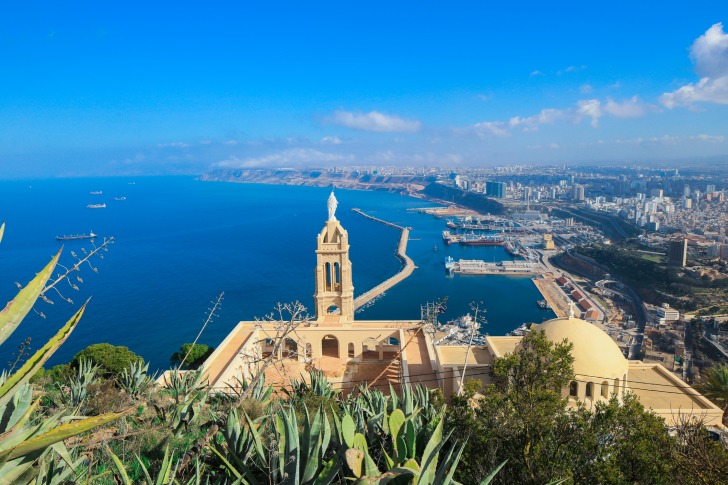
3. Oran
Located in northwest Algeria, Oran is the second-largest city in the country.
As a major port city, Oran is an economic hub for the entire country.
Because of its location on the Gulf of Oran, its history is filled with foreign influences.
From the food, diverse culture, and nightlife, to Oran’s ancient ruins, these influences can still be seen today.
Despite its many wonders, foreigners visiting Oran should exercise caution when visiting the area.
With a crime rate of 58.3, Oran is known for having high levels of crime involving drugs, theft, and corruption.
Travelers are urged to remove all valuables from their cars before locking them and should never walk alone, day or night.
As with many parts of Algeria, there have been reports of terrorist attacks in Oran.
To remain safe, check official notifications regularly and travel by plane from one destination to the next whenever possible.
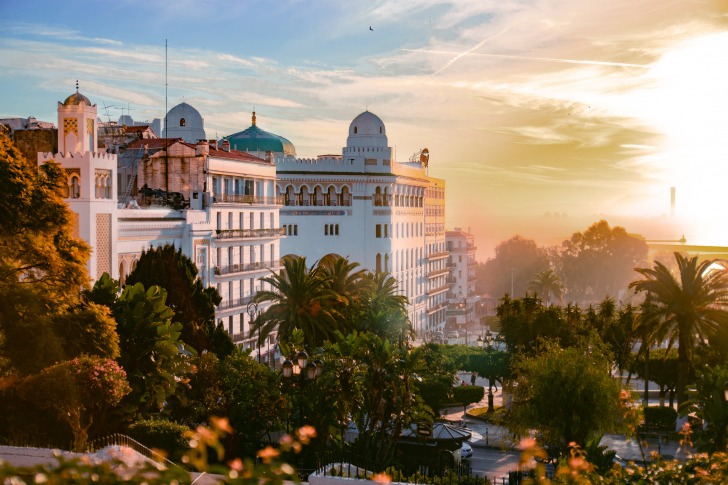
4. Algiers
Another popular coastal tourist destination is the capital city of Algiers.
With a population of over 3 million, Algiers is known for its diverse culture, historic architecture, and divine cuisine.
Unfortunately, Algiers is also known as a dangerous city with a high crime rate.
Algiers’ crime index is just under 52, with high levels of drugs, corruption, and petty crimes.
Tourists are encouraged to keep their valuables hidden and secure when visiting the city and never walk alone after dark.
As the capital city, Algiers’ history includes civil disobedience, protests, and demonstrations.
Travelers should remain abreast of local news and are encouraged to use a guide when visiting the Casbah.
Locals recommend staying away from the Sablettes Walkway and the Ardis supermarket near the beach.
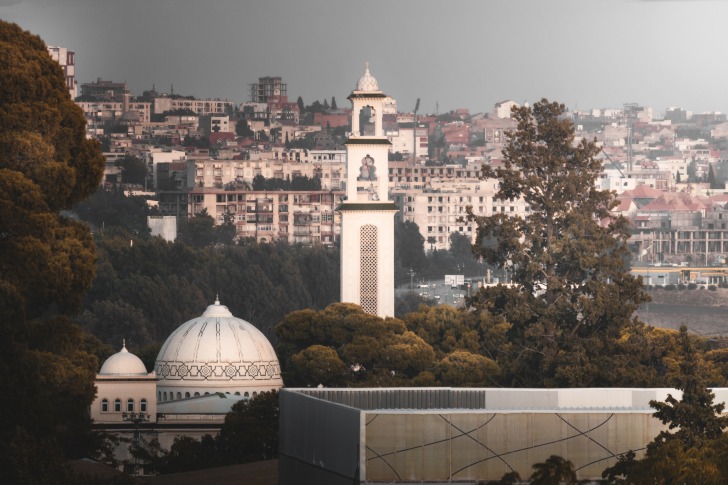
5. Setif
Situated in the northeast Aures Mountains is the Algerian city of Setif.
In addition to being an industrial and agricultural center, Setif is known for its rich cultural history.
Popular attractions include the ancient Roman baths, the Great Mosque of Setif, and several other ancient monuments.
While Setif’s current crime index is 53.33, the city has experienced an increase in crime over the last three years.
Travelers should be aware of their surroundings at all times, lock their doors, and keep their valuables secure at all times.
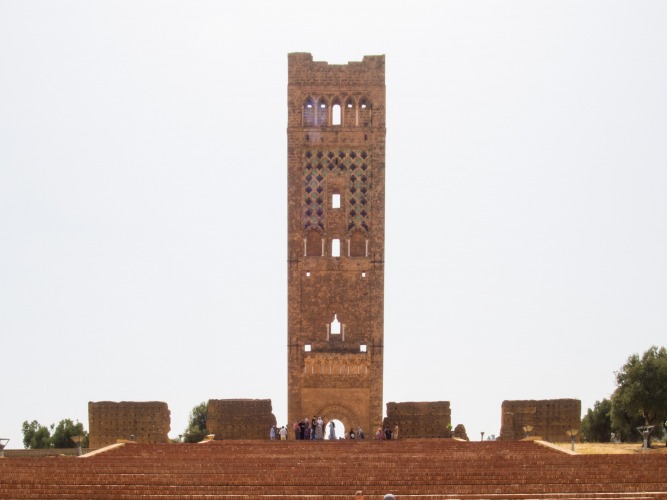
6. Tlemcen
Located in northwest Algeria, near the Moroccan border, is the Algerian city of Tlemcen.
Established in 1235, this quiet city is known as the spiritual center of Algeria.
Once ruled by Romans, Ottomans, and Berbers, diverse cultural influences can be found in every nook and cranny of Tlemcen.
Popular tourist attractions include the Mosque and Tomb of Sidi Boumediene, Mansurah mosque, the Great Mosque Of Tlemcen, and the 100-meter-high hill known as Lalla Setti.
While Tlemcen has experienced an increase in crime over the last few years, the city is generally a safe place to visit.
Travelers can feel safe walking the streets during daylight but should avoid walking alone after dark.
Tourists are also encouraged to stick to the main streets of Tlemcen and avoid large gatherings.
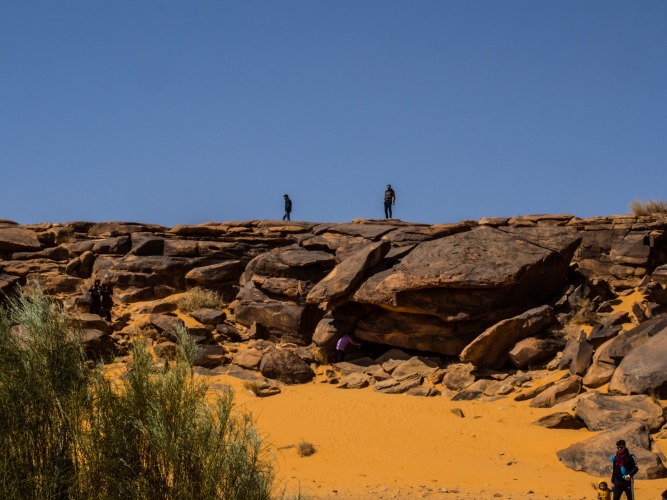
7. Bechar
In the southwestern corner of Algeria, near the border with Mauritania, lies the city of Bechar.
Unlike cities on the Mediterranean coast, Bechar’s natural landscape includes sand dunes, green oases, and palm trees.
Most known for its coal mines, Bechar is now a leader in jewelry and leather works.
Purse snatching and pickpocketing are the biggest threats in this unique region, which has a crime rating of 52.
While Bechar hasn’t seen any major terrorist attacks in quite some time, travelers should exercise caution and stay alert at all times.
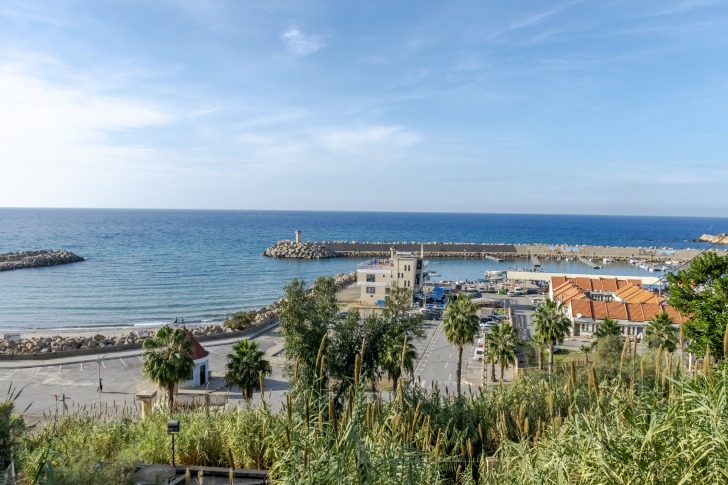
8. Tizi Ouzou
Located approximately 65 miles from the capital city of Algiers in the city of Tizi Ouzou.
Known for its Berber culture, this scenic city is filled with historical and cultural sites.
Popular attractions include mountain hikes, Tipasa Roman ruins, museums, and galleries.
With a crime rate of 47.83, Tizi Ouzou is known for higher rates of corruption, bribery, and muggings.
Travelers are encouraged to use a local travel guide whenever possible and avoid movement outside the city center after dark.
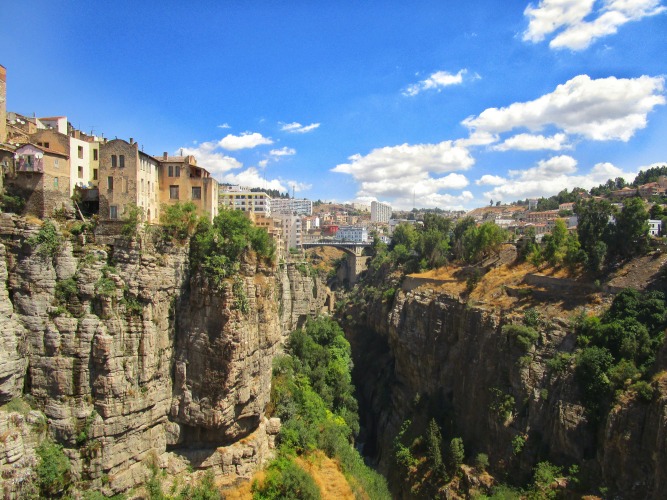
9. Constantine
As the capital of Constantine Province, Constantine is infamous for being the home to the Sidi M’Cid Bridge, the longest suspension bridge in Africa.
Tourists from across the globe visit Constantine for its scenic landscapes and ancient ruins dating back to Berber and Roman times.
Despite Cosntantine’s moderate crime index score of 42.5, travelers should remain vigilant at all times when visiting this historic city.
The city does not have a high rate of violent crime but is known for pickpocketing, petty crimes, corruption, and bribery.
When in Constantine, avoid areas of the city with a militant presence and do not walk alone after dark.
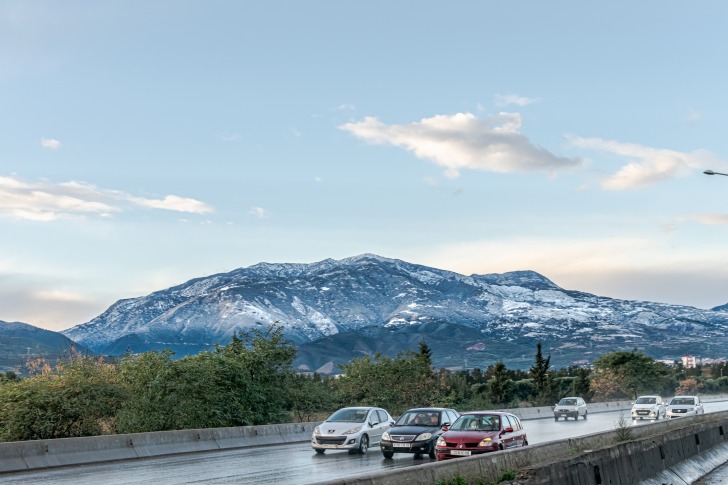
10. Blida
Less than 30 miles from Algiers is the spectacular city of Blida.
With a population of 350,000, Blida is known for its vibrant nightlife, shopping, and large selection of restaurants and safes.
The Chiffa River runs through the city and the lush vegetation of the Mitidja Plain, both of which add to the picturesque landscape of this charming city.
Other popular tourist attractions include the ancient ruins of a 12th-century castle, the Great Mosque of Blida, and the ruins of a Roman aqueduct.
While Blida’s stunning natural landscapes and ancient ruins make it a popular spot for tourists, the city does have a history of terrorist attacks.
Travelers should avoid any active demonstrations and watch the local news for up-to-date information.
In addition to the threat of terrorist activity, Blida also has a lot of drug activity, corruption, and bribery.
5 Safety Tips for Traveling to Algeria
- Visit your government’s website to learn about current travel advisories. Travel.State.Gov. is an excellent resource for anyone planning to travel overseas. It offers up-to-date travel advisories, as well as region-specific advice. Enrolling in STEP is also recommended. This program makes it easier to locate travelers in an emergency and sends updated alerts when safety conditions change.
- Notify the Algerian government if you plan to travel outside of the country’s major cities. Depending upon where you plan to visit, the government may provide you with an armed escort. A guide is recommended if you venture out into uninhabited regions.
- Check with the CDC before traveling. The CDC provides valuable information regarding current health notices, non-vaccine-preventable diseases you should be aware of, and vaccine requirements.
- Be vigilant at all times. While Algeria does not have a lot of gun or drug violence like other countries, car thefts, and muggings occur regularly. Travelers should always park close to where they’re staying and take anything of value with them. If you must park farther than 100 meters from your home, park in a guarded parking lot. Stay on the main streets whenever possible.
- Avoid going out at night. If you must walk around after dark, walk with a group of people (preferably locals). Research which parts of the city to avoid. Try to blend in. Wearing flashy clothes and jewelry makes you a target for muggers.
Algeria Safety Overview
READ THE FULL REPORT: Algeria Safety Review
Safety Index: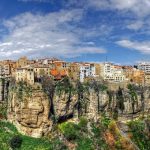
- OVERALL RISK: HIGH
- TRANSPORT & TAXIS RISK: MEDIUM
- PICKPOCKETS RISK: MEDIUM
- NATURAL DISASTERS RISK: MEDIUM
- MUGGING RISK: HIGH
- TERRORISM RISK: HIGH
- SCAMS RISK: HIGH
- WOMEN TRAVELERS RISK: MEDIUM
Frequently Asked Questions
Do I need a visa before traveling to Algeria?
Yes, all travelers visiting Algeria must submit a visa application (and be accepted) to the Embassy of Algeria before entering the country.
What is the safest city in Algeria?
Taghit is considered the safest city in Algeria.
It’s also considered the most picturesque and is home to several luxury accommodations.
Do they speak English in Algeria?
While Algerian Arabic and Berber are the two official languages of Algeria, a large percentage of the country speaks English and French as a second language.
